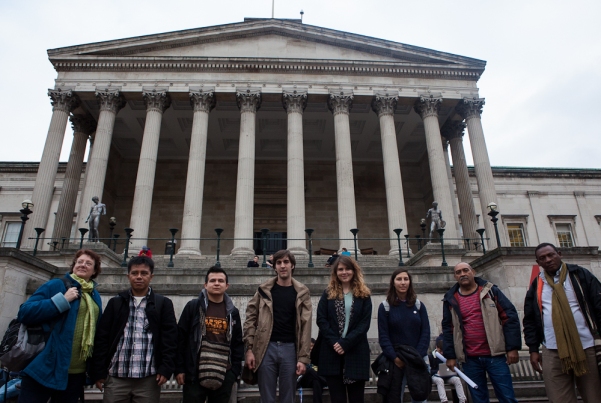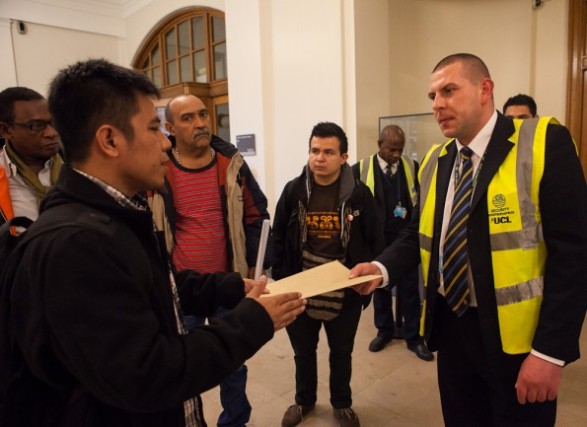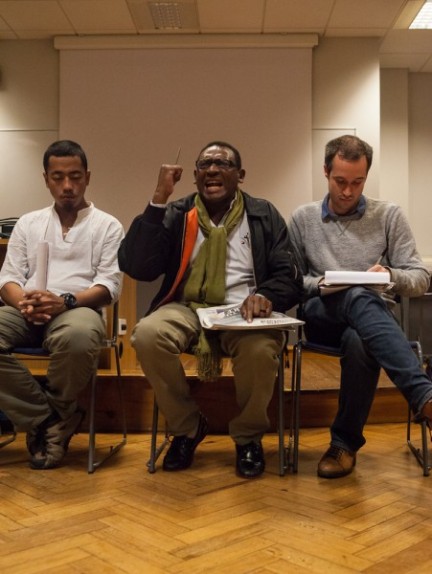Yesterday afternoon we welcomed four inspiring visitors from Columbia, Indonesia and the Philippines, who are touring the UK as part of their Dirty Coal tour with the London Mining Network. They had been to ask questions at the AGM for BHP Billiton, one of the largest mining companies in the world that is desecrating their homes in order to mine for coal. They are responsible for forcing indigenous people to accept tiny sums of compensation in exchange for their land, after which they clear luscious rainforest and drain rivers to make way for coal mines.
After the AGM they visited the UCL campus in order to give our Provost Michael Arthur a letter, asking the university to divest from BHP Billiton. The Provost refused to meet them (shocker), but a security guard ensured the letter would be delivered safely to him. BHP Billiton is one of the unethical British companies that UCL invests in, and therefore one that we are trying to disassociate the university from. Later in the evening, we heard stories from each speaker about how their communities had been destroyed by the company and their livelihoods shattered.
We made our way to SOAS for the evening event, as UCLU decided to be über bureaucratic and cancel our room booking – thanks to SOAS for helping out at such short notice! Our four speakers, Rogelio, Francisco, Daryll and Pius, then told us about the fear and danger they were faced with at home from those who were exploiting their land.
Rogelio spoke passionately about the damage caused to his land by the Cerrejon mine in Columbia, joint owned by BHP Billiton, Glencore Xstrata and Anglo American. Their mines are sickeningly named after communities who have been displaced to build them, and 66% of the region are now living in poverty. Rogelio spoke of how 3,000 children have died in the last three years from drought, as the company drains the river to reach the coal underneath. They are no longer able to eat the natural produce they would have grown themselves, as they have no land on which to grow it; they have become consumers, forced to buy GM and chemical-ridden crops which is having a marked effect on their health. Anyone who stands in the way is falsely accused of collaborating with guerrilla groups.
Next we heard Pius from Friends of the Earth Indonesia, who are currently trying to stop BHP Billiton’s next Indomet mining project in the forests of Kalimantan. The communities here live off the forest in a healthy, sustainable way, hunting, fishing and drinking water from the rivers. The planned destruction of 350,000 hectares would be a huge problem for the communities’ survival, but the company is determined to exploit them. In the south, the forests are already being destroyed to fuel the palm oil industry; if the northern forests are destroyed too, the indigenous people will have nothing.
Lastly we heard Daryll from the Philippines, where a tribe of 20,000 people are facing extinction through the work of mining company Glencore Xstrata. Activists, environmentalists and their families are being massacred for protesting against the mass displacement of indigenous people; Daryll spoke of how a soldier killed a pregnant woman and her two children to try and deter her husband, the leader of an environmental group. Only 7,000 hectares of canopy rainforest now remain, but the government is allowing Glencore’s work and putting military operations in place to intimidate communities.
It was amazing to hear the stories of these men, who are living in danger every day for standing up for their communities. UCL have to take responsibility for their dirty investments; not only are they investing directly in these companies, but their Institute for Sustainable Resources is actually funded by BHP Billiton. By accepting their money, UCL are legitimising their exploitation and greenwashing their reputation.
Please sign our petition to force UCL to divest from companies like BHP Billiton, and keep the momentum going to put pressure on institutions worldwide to abandon dirty investments. You can find out more about the London Mining Network here.



